Cheese posties, flat-packed shoes, personalised potatoes: These are the world’s weirdest businesses
SENDING people potatoes with a message scribbled on it is now a thing. It has been branded a stupid idea, but it’s not the only weird business making big bucks.

THERE are many things you can do with a potato, but writing a message on one and sending it to someone through the mail isn’t top of the list.
Alex Craig, an app developer from North Texas, is raking in the cash by sending people potatoes anonymously.
Potato Parcel is his start-up business, and Mr Craig claims he is clearing $US10,000 ($A13,640) a month.
His girlfriend was the first to question the business idea. “She said, ‘You will not sell a single potato. This is the stupidest idea I’ve ever heard’,” Mr Craig told WFFA.com. “On our second day that we were live, and we started promoting it on Reddit, and we got $2000 in orders, and I just knew this was it.”
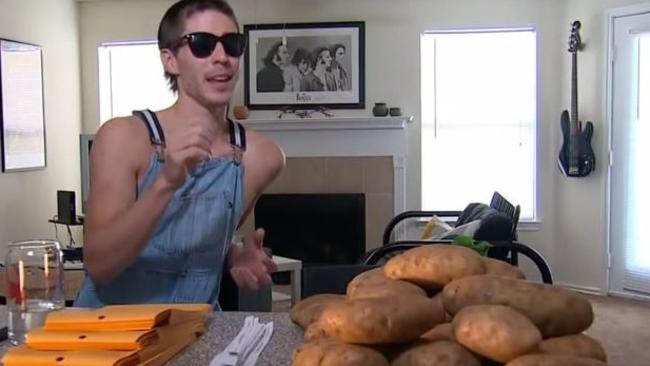
It seems every ridiculous invention you could ever dream of has now been brought to life.
In the age of crowd-funding, digital printing and online business networking, the possibilities are endless for aspiring entrepreneurs.
And while the runaway success of Ship Your Enemies Glitter has sparked a boom in quirky start-ups, it remains to be seen whether any of them will stand the test of time.
The single-purpose site, which sold for more than $100,000 less than two weeks after launching, was in the headlines again this week after same-sex marriage advocates sent a glitter-filled envelope to Liberal MP Craig Laundy.
Six police cars, six fire trucks and a hazmat unit attended the Reid MP’s Sydney office after a staffer raised the alarm over a “suspicious substance”.
At least Mr Laundy received glitter and not one of the many copycat products on the market, which include a bag of penis-shaped gummy lollies and smelly poo in a box.

The 22-year-old Australian man who sparked the trend, Mathew Carpenter, has said he started the site as a joke and was taken aback by the deluge of orders he received.
In fact, the project was a well-planned media stunt by the young online marketing entrepreneur.
Nonetheless, it sparked a slew of similar ventures by those eager to cash in, with some leaving us wondering whether humanity might be nearing the limits of progress.
Here are five weird and wonderful start-ups attempting to make the world a better place.
1. THE CHEESE POSTIE
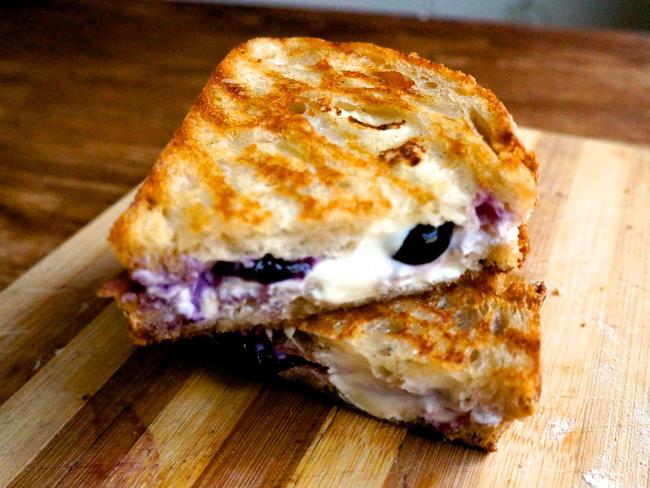
Everyone loves a cheese toastie, but raise your hand if you’d pay to get a blueberry flavoured one in the mail? Now keep your hand raised if you’d commit to an ongoing subscription for a weekly delivery of a mystery-flavoured cheese toastie ... One that isn’t toasted yet.
That’s the premise behind a London-based company that promises to deliver build-your-own cheese toastie kits, put together at an Essex sandwich factory.
On face value, it seems like a stoner’s whim brought to life, but Cheese Postie co-founder Dave Rotheroe gives every impression of being deadly serious about the venture’s prospects.
Tantalising images of melted cheese oozing out of a piping hot sandwich are featured in the promotional material, but the sandwiches — which come in left-of-field flavours like blueberry and cream cheese, choc cheesecake, Stilon and raspberry or French onion soup — aren’t actually cooked before being posted.
The make-your-own toastie kit must be assembled and toasted by the customer, who also needs to commit to a £3.99 ($A8.50) weekly subscription.
“It comes in a small box and in there’s two slices of artisanal bread, different cheeses, condiments, butter and a little teflon toastie bag,” Mr Rotheroe said. “Pop it in your toaster and toast it as you desire.”
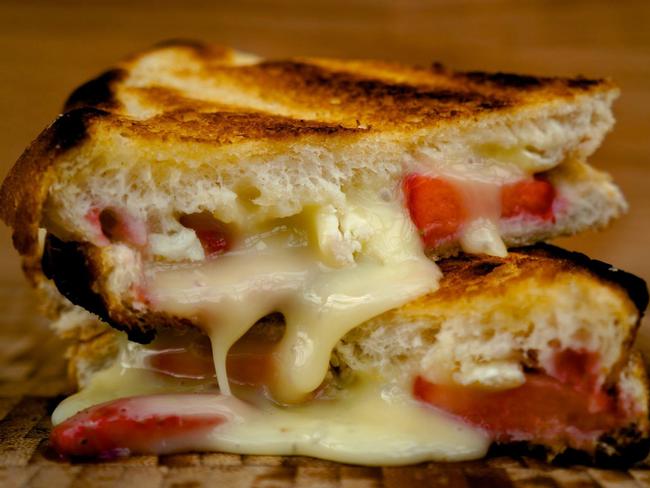
Speaking on BBC radio, Mr Rotheroe shrugged off suggestions that his product might be superfluous and impractical, with the program’s host challenging: “You must be dealing with pretty clueless people that obviously can’t make their own toastie, so what makes you think they’re going to be able to assemble yours?”
The toastrepreneur stood firm, defending his product as both practical and good value.
“There is a little bit of effort required on your side, but not too much,” he said.
“It’s actually a bit less than you’d pay for a toasted cheese sandwich in a lot of places around London.”
The point of it all, however, was not convenience or cost but novelty value.
“The thing were going for is really quirky ideas,” Mr Rotheroe said.
“We’ll get some ideas off you about what you like, and we’ve got an algorithm that works out what to send you each week.”
Mr Rothroe found his business partner Danny, who owns the factory where the postie kits will be produced, on Kickstarter — where he raised £3809 ($A8116) from 308 supporters to help bring the project to life.
We’ll be interested to see how many Cheese Posties make it to the kitchen table.
2. FLAT-PACKED SHOES
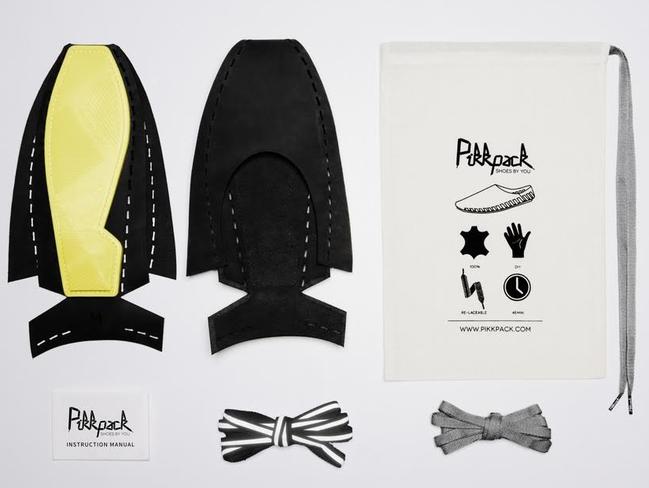
The fashion set will doubtless recoil in horror, but the Ikea of footwear has arrived. DIY devotees can now buy ready-to-assemble shoes on the internet. That’s right, shoes.
Now I’m no style queen, but I am aware that practicality and elegance seldom coexist, especially in the footwear realm.
But the rules of fashion did not discourage Pikkpack founder Sara Gulyas, whose project also began with a Kickstarter campaign.
The designer raised a whopping $US20,000 (about $A115,000) through the site in May last year, and sold 200 prototype pairs in the process. Yet after all the hype, Pikkpack is now only selling about three pairs a week.
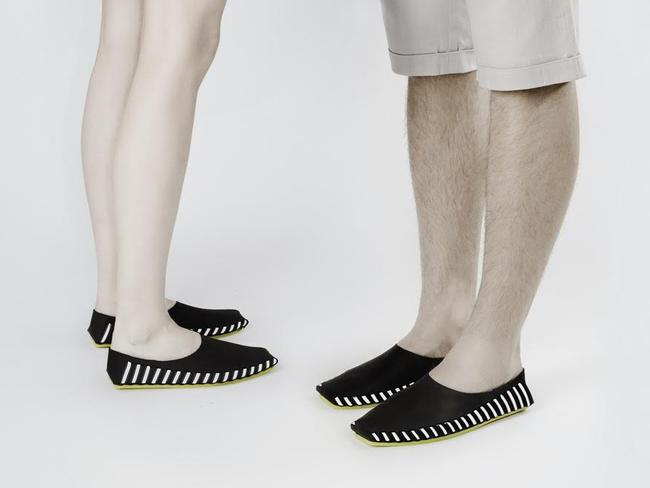
Ms Gulyas told news.com.au she was inspired to create a shoe “with the minimal amount of material possible and that would involve the wearer in the shoe making process”.
“I love the idea of co-creation,” she said.
If manufacturing as performance art is the object of the venture, perhaps it matters not how many pairs are sold.
Pikkpack shoes cost $US99 plus postage, and putting the shoe together takes about 45 minutes.
“I like to see it as a meditative process with the positive effects of crafting,” Ms Gulyas said.
The shoes are hand-sewn and manufactured by local craftsmen and women in a small Hungarian town called Martfű, in a contemporary design based on the nation’s traditional shoe called a Bocskor.
3. THE AC SOFA

All I want for Christmas is an airconditioned couch, said no one ever. But there could be something to this invention by Indian air conditioner repairman Dashrath Patel.
His climate-controlled couch will be marketed to hotels, bars and outdoor restaurants in tropical climes, where that old sweaty-bum-sticking-to-leather feeling could soon be a thing of the past.
It’s not the first time an airconditioned innovation has made headlines. Former Sony technician Hiroshi Ichigaya invented an AC T-shirt in 2009, and you can buy one from his company Kuchofuku.
Back then, Mr Ichigaya said of the product: “It’s true, the shirts make you look like a Michelin Man, but on factory floors people are more worried about being able to do their jobs in comfort.”
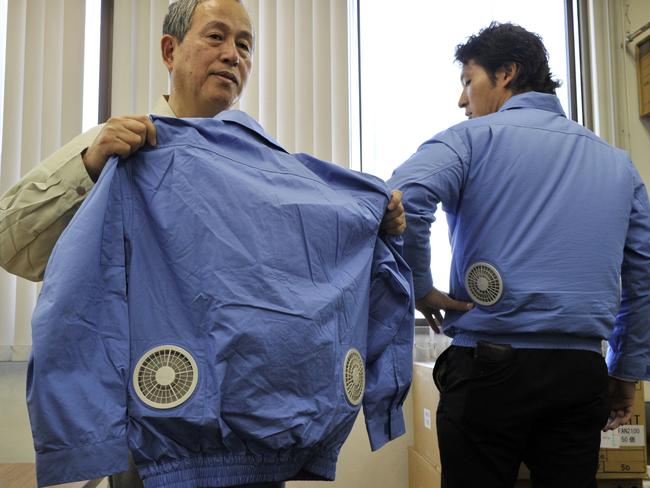
Mr Patel, who hails from Gandhinagar, started working on his sofa in 2008, building a prototype that weighed an impractical 175kg.
With the help of India’s National Institute of Design, he whittled it down to a manageable 35kg by building the sofa’s components from glass fibre and PVC instead of wood.
The government-sponsored design clinic scheme paired Mr Patel up with designer Ankit Vyas who helped him finesse the invention, which will sell for between $2600 and $3250.
“It works like a split AC with a unit inside the sofa linked by pipe to an outer unit. The airflow will come out from the hand-rest part of the sofa,” Mr Vyas told the Press Trust of India.
“It will simply work like a house AC. You can increase or decrease the temperature with a remote control, and it can also run on fan-mode … It will be used by event management firms or the terrace restaurants.”
He said tower ACs used at political or religious gatherings throughout India consumed a lot of electricity, while the AC sofa would scale this back by 10 per cent.
4. SCENT MESSAGING
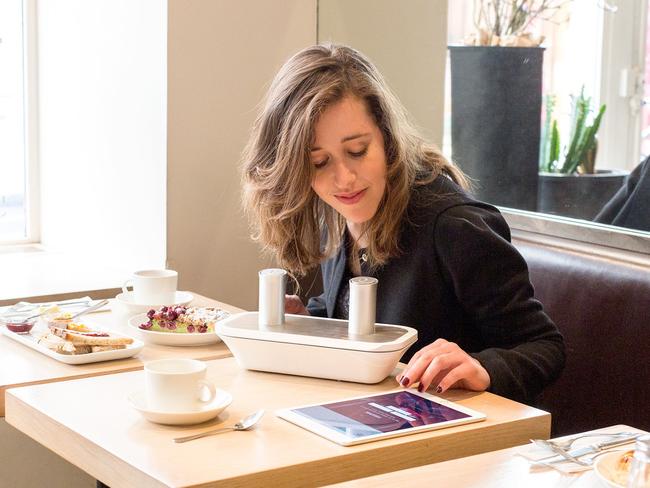
Now this is an invention to be sniffed at: the smell-o-phone has arrived. Scent-based messaging platform oSnap, available on iTunes, allows users to take a picture, tag it with a scent, and send it to a friend.
It works in conjunction with a device called the a device called the oPhone Duo, which looks like a cylinder with a button on top, and is loaded with scent cartridges called oChips.
Last year, the scientists made it send the smell of champagne and macaroons from Paris to New York, and now ordinary folk can repeat the experience.
The initial release includes three families of scents — coffee, foodie and memory — each of which comprises eight oChips with one to four scents each; examples include smoke, whiskey, strawberry, saffron, vegetable, tomato, rosemary and baguette.
Once inside the oPhone the 32 scents can mix to give more than 300,000 unique aroma combinations.
While oSnap is too new to have any user reviews on iTunes, UK innovation charity Nesta has predicted that it will take off this year.
oNotes plans to expand the technology create immersive experiences for television, books and movies.
Prototypes of the device have been around since the 1960s, but Nesta project manager Josh McNorton told the Daily Mail he believed the world was finally ready.
“While we’ve turned our noses up at past attempts, I believe 2015 is the year ‘smell-o-vision’ will finally lose its stink,” Mr McNorton said.
“Imagine the next selfie you see posted is accompanied by the scent of perfume. The Instagram photo of your gourmet steak dinner comes with a whiff of buttery mashed potatoes.”
5. FAKE WEDDINGS

You might think western Sydney deputy mayor Salim Mehajer’s lavish wedding was ridiculous, but at least it wasn’t a dress rehearsal.
Some high-flyers are so anxious about their nuptials that a business has sprung up to give them a real-life run through, complete with a sit-down meal and bridal waltz.
The Big Fake Wedding bills itself “as an alternative to a traditional bridal show, where a group of hand-selected vendors get together and throw a fake wedding.”
Brides attend as wedding guests so that they can experience first-hand what the vendors can do. The event is complete with a ceremony, dinner and dance party reception.
Wedding photographer Callie Murray started the business to allow future brides and grooms to experience potential venues in action before committing, hosting up to 30 fake weddings across the United States each year.
“I’m not just talking to them at a booth, but I can see what they’re capable of,” one bride-to-be told Today.
“For a bride spending so much money on a wedding, it’s really important.”
THAT’S ALL, FOLKS
If you can think of a business idea that hasn’t been invented yet, get cracking. There has to be a limit to all this craziness.




